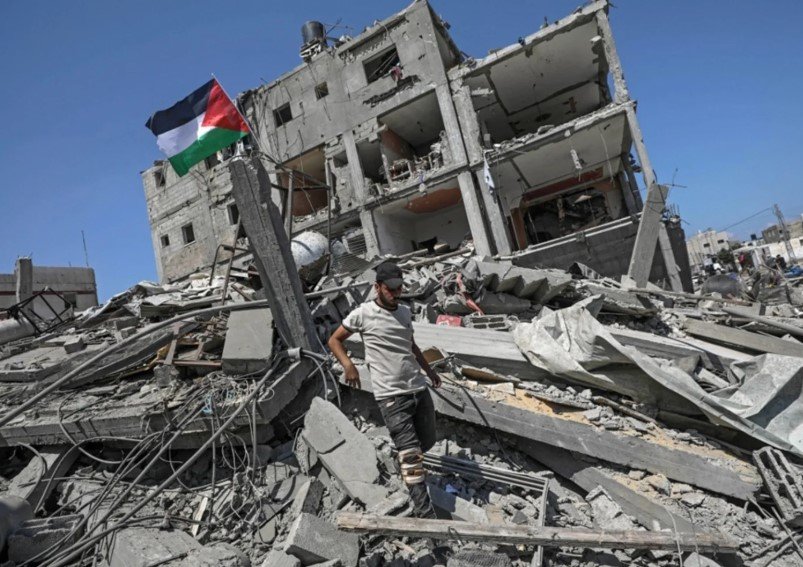The much-anticipated ceasefire between Israel and Hamas, which was set to end over a year of devastating conflict, has been postponed after the militant group failed to meet critical conditions set by Israel. As attacks continue, both sides remain entrenched in their positions.
Ceasefire Postponed Over Missing Hostage List
The ceasefire, initially slated to begin on Sunday morning, has been delayed after the Israeli Defense Forces (IDF) confirmed that Hamas had not provided the required list of hostages to be freed. The IDF continued its airstrikes in Gaza as the clock ticked past the ceasefire deadline.
Rear Admiral Daniel Hagari, a military spokesperson, said, “The IDF continues to strike within Gaza at this time. According to the prime minister’s directives, the ceasefire will not come into effect until Hamas fulfills its commitments.” The IDF’s hardline stance comes after months of intense conflict, which saw the deaths of over 46,000 Palestinians and more than 1,200 Israelis.
Hamas, for its part, claimed that it was ready to hand over the list “any moment” but blamed the delay on the ongoing bombardment and logistical difficulties caused by the conflict. The delayed ceasefire underscores the fragile nature of the agreement and the complicated path toward peace in the region.

The Three-Stage Ceasefire Process
The ceasefire agreement, which was designed to unfold in three distinct phases, aims to bring an end to the 15-month war. The first stage would involve the release of some hostages, primarily women, children, and the elderly, in exchange for Palestinian prisoners. While the first exchanges were supposed to take place on Sunday, the lack of a clear hostages list from Hamas left Israel no choice but to delay the truce.
While Israel continues its military actions in Gaza, hopes of a long-awaited respite for the people of Gaza remain uncertain. The humanitarian crisis, particularly in Gaza City and surrounding areas, continues to worsen as the violence intensifies.
The second stage, expected to address the permanent end of the conflict, would see the full release of remaining hostages in exchange for more Palestinian prisoners, with a comprehensive Israeli withdrawal from Gaza. The final stage would focus on rebuilding Gaza’s decimated infrastructure, but experts warn that this could take years.
International Reactions and Concerns
The delay has prompted mixed reactions from the international community. U.S. President Joe Biden, who was heavily involved in mediating the ceasefire, has expressed hopes that the situation can still be resolved. In his latest statement, Biden emphasized the need for hostages to return to their families and called for an end to the bloodshed.
“We hope that we can avoid further violence and help facilitate a lasting peace,” Biden remarked, with a cautious optimism that the conflict’s end would mark a new chapter in the region’s stability. However, the increasing volatility of the ceasefire process has raised doubts about its long-term effectiveness.
Former U.S. President Donald Trump, who was also involved in the ceasefire talks, has asserted that his involvement played a key role in bringing both sides to the negotiation table. In his remarks, Trump indicated that he would back Israel’s right to resume military action if the ceasefire collapses.
Gaza’s Humanitarian Crisis and the Struggle for Relief
In Gaza, where the conflict has left an overwhelming toll on civilians, there is a palpable sense of fear mixed with hope. As the ceasefire was delayed, displaced Gazans who had fled their homes were preparing to return in anticipation of the truce.
Nasr al-Gharabli, a resident of Gaza City who sought refuge in a southern camp, shared his deep longing to return home. “I will go to kiss my land. If I die on my land, it would be better than being here as a displaced person,” he said, expressing a sentiment shared by many who have suffered through the violence and destruction.
As the humanitarian crisis deepens, aid organizations continue to push for urgent relief efforts. Many have warned that without a concrete and lasting ceasefire, the region’s ability to recover from the devastation caused by the war will remain limited.
Prospects for Post-War Governance
As the ceasefire unfolds in stages, questions linger about Gaza’s future political landscape. The Palestinian Authority (PA), which has limited control in the West Bank, has expressed readiness to take responsibility in Gaza post-war, but Israel has shown reluctance to engage with either Hamas or the PA in any long-term governance role.
The political vacuum left by Hamas’s rule over Gaza for nearly two decades remains a complex issue. With both the IDF and Hamas entrenched in their positions, the situation remains tense, and a clear path to peace remains elusive.
